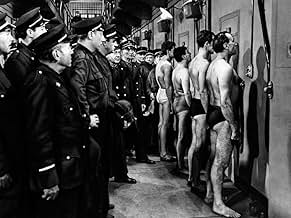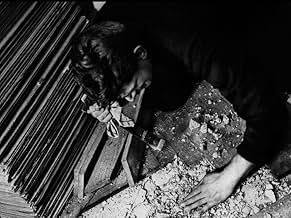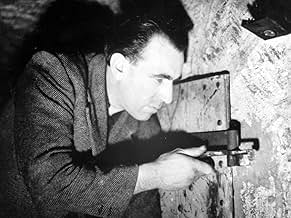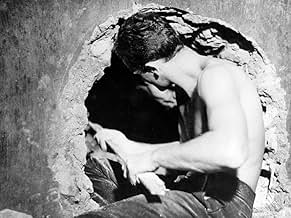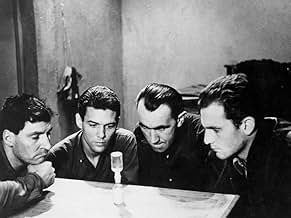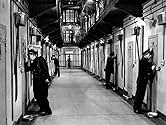IMDb रेटिंग
8.5/10
21 हज़ार
आपकी रेटिंग
अपनी भाषा में प्लॉट जोड़ेंDistrust and uncertainty arise when four long-term inmates cautiously induct a new prisoner into their elaborate prison-break scheme.Distrust and uncertainty arise when four long-term inmates cautiously induct a new prisoner into their elaborate prison-break scheme.Distrust and uncertainty arise when four long-term inmates cautiously induct a new prisoner into their elaborate prison-break scheme.
- 2 BAFTA अवार्ड के लिए नामांकित
- 2 जीत और कुल 4 नामांकन
Marc Michel
- Claude Gaspard
- (as Mark Michel)
Jean-Paul Coquelin
- Le lieutenant Grinval
- (as J. Paul Coquelin)
Albert Augier
- Un gardien
- (बिना क्रेडिट के)
Jean Becker
- Un gardien
- (बिना क्रेडिट के)
Mick Besson
- Deuxième plombier
- (बिना क्रेडिट के)
Georges Bielec
- Figurant
- (बिना क्रेडिट के)
Raymond Bour
- Un gardien
- (बिना क्रेडिट के)
Philippe Dumat
- Un gardien
- (बिना क्रेडिट के)
Gérard Hernandez
- Le détenu à l'infirmerie
- (बिना क्रेडिट के)
Jean Luisi
- Un détenu
- (बिना क्रेडिट के)
कहानी
क्या आपको पता है
- ट्रिवियाThe scene where three different characters take turns breaking through the concrete floor of their cell is filmed in a single, nearly four minute long, shot.
- गूफ़When Geo checks the corridor with the mirror and takes a break to say goodbye to his cellmates, he leaves the mirror in the hole. However, when he goes back to checking the corridor he has to stick the mirror back into the hole first.
- भाव
[last lines]
Roland Darban: [stripped, facing the wall under guard] Poor Gaspard.
- कनेक्शनFeatured in Mon père, il m'a sauvé la vie (2001)
फीचर्ड रिव्यू
Probably, to really get "Le Trou", this splendid, intense movie, you have to be conscious that the great Jacques Becker was dying during the making of the film. A quiet stoicism permeates this work of art. The story is supposed to be very sad, but it isn't. The guys on the screen are too tough, by no means apt to mourn their dire destiny or, metaphorically, to ask for the viewer's sympathy.
We have the true story of the hole dug by a bunch of in-mates to escape from a jail in Paris. The screenplay is taken from a novel of the distinguished writer and film-maker Jose' Giovanni, himself formerly a convict. Becker chooses to tell the story in the simplest, neatest possible way. No music at all, an essential, dry, sharp yet powerful dialog. The in-mates do their job, to try to escape. The director avoids the annoying cliché, typical of the American jail-movies, of showing the wardens as sadistic torturers. They are tough and strict, they don't like but they feel no hate for the prisoners. The wardens just do their job, that's all. In fact, there are no really despicable characters in the film. At his last appointment with the art of cinema, Becker seems to accept and forgive all human beings.
A brilliant idea is to show how the guys turn common objects and waste iron into the tools needed for the escape (a key, a lamp, a pick, a sand-glass). The little periscope made with a tooth-brush gives raise to a shocking scene, few seconds of great cinema. We follow the in-mates' apparently endless, exhausting labor of digging and sewing. That should be rather boring for the viewer, but it isn't. How comes there's not a single moment of bore in the film? That's the privilege of Art.
The work of the camera and the black and white photography are sensational, and convey the intense emotions of the characters. The psychological study is made in such an understated way that you may overlook it at a first view. But, after seeing the movie a second time, and knowing the development of the story, you fully appreciate how the psychology of the characters is treated, with accuracy and depth. The actors make an excellent job. This is stunning, thinking that "Le Trou" was the first movie for Philippe Leroy and Michel Constantin, later prominent actors of French cinema. And Jean Keraudy wasn't a professional actor, he was one of the in-mates that actually dug the hole fourteen years earlier! (at least, this is stated by himself at the beginning of the movie, and is testified in several books on French cinema)
Are there deep messages in the film? Two wardens bring a fly to feed a spider. There is the spider, a patent symbol of death, ghastly in its immobility. Two prisoners are peeping and wondering: what the hell are the wardens doing? Got no idea. And who cares, after all? Maybe that is Becker's dry, ironic message. Don't be too deep. Fight against bad luck, be stoic and brave. Who cares, after all?
My opinion is that the artist Becker, displaying the same toughness of the guys on the screen, just fought to leave us a major work of art. Our task of viewers is to enjoy and love it. "Le Trou" is an unforgettable film, which honors the art of cinema.
We have the true story of the hole dug by a bunch of in-mates to escape from a jail in Paris. The screenplay is taken from a novel of the distinguished writer and film-maker Jose' Giovanni, himself formerly a convict. Becker chooses to tell the story in the simplest, neatest possible way. No music at all, an essential, dry, sharp yet powerful dialog. The in-mates do their job, to try to escape. The director avoids the annoying cliché, typical of the American jail-movies, of showing the wardens as sadistic torturers. They are tough and strict, they don't like but they feel no hate for the prisoners. The wardens just do their job, that's all. In fact, there are no really despicable characters in the film. At his last appointment with the art of cinema, Becker seems to accept and forgive all human beings.
A brilliant idea is to show how the guys turn common objects and waste iron into the tools needed for the escape (a key, a lamp, a pick, a sand-glass). The little periscope made with a tooth-brush gives raise to a shocking scene, few seconds of great cinema. We follow the in-mates' apparently endless, exhausting labor of digging and sewing. That should be rather boring for the viewer, but it isn't. How comes there's not a single moment of bore in the film? That's the privilege of Art.
The work of the camera and the black and white photography are sensational, and convey the intense emotions of the characters. The psychological study is made in such an understated way that you may overlook it at a first view. But, after seeing the movie a second time, and knowing the development of the story, you fully appreciate how the psychology of the characters is treated, with accuracy and depth. The actors make an excellent job. This is stunning, thinking that "Le Trou" was the first movie for Philippe Leroy and Michel Constantin, later prominent actors of French cinema. And Jean Keraudy wasn't a professional actor, he was one of the in-mates that actually dug the hole fourteen years earlier! (at least, this is stated by himself at the beginning of the movie, and is testified in several books on French cinema)
Are there deep messages in the film? Two wardens bring a fly to feed a spider. There is the spider, a patent symbol of death, ghastly in its immobility. Two prisoners are peeping and wondering: what the hell are the wardens doing? Got no idea. And who cares, after all? Maybe that is Becker's dry, ironic message. Don't be too deep. Fight against bad luck, be stoic and brave. Who cares, after all?
My opinion is that the artist Becker, displaying the same toughness of the guys on the screen, just fought to leave us a major work of art. Our task of viewers is to enjoy and love it. "Le Trou" is an unforgettable film, which honors the art of cinema.
टॉप पसंद
रेटिंग देने के लिए साइन-इन करें और वैयक्तिकृत सुझावों के लिए वॉचलिस्ट करें
- How long is The Hole?Alexa द्वारा संचालित
विवरण
बॉक्स ऑफ़िस
- US और कनाडा में सकल
- $34,588
- US और कनाडा में पहले सप्ताह में कुल कमाई
- $6,756
- 2 जुल॰ 2017
- दुनिया भर में सकल
- $34,588
- चलने की अवधि2 घंटे 11 मिनट
- रंग
- पक्ष अनुपात
- 1.66 : 1
इस पेज में योगदान दें
किसी बदलाव का सुझाव दें या अनुपलब्ध कॉन्टेंट जोड़ें




